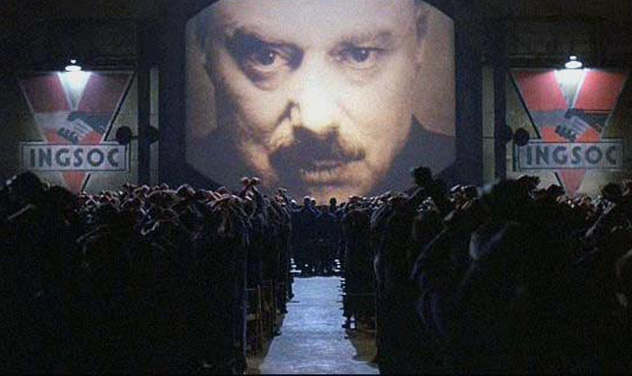 History
History  History
History  Health
Health 10 Everyday Activities That Secretly Alter Consciousness
 History
History Top 10 Historical Disasters Caused by Someone Calling in Sick
 Animals
Animals 10 New Shark Secrets That Recently Dropped
 Movies and TV
Movies and TV 10 Forgotten Realities of Early Live Television Broadcasts
 Technology
Technology 10 Stopgap Technologies That Became Industry Standards
 Weird Stuff
Weird Stuff 10 Wild Facts About Taxidermy That You Probably Didn’t Know
 Travel
Travel 10 Beautiful Travel Destinations (That Will Kill You)
 Miscellaneous
Miscellaneous 10 Modern Marriage Rituals Born from Corporate Branding
 Weird Stuff
Weird Stuff Ten Bizarre Visions of 2026 from Fiction
 History
History 10 “Modern” Problems with Surprising Historical Analogs
 Health
Health 10 Everyday Activities That Secretly Alter Consciousness
 History
History Top 10 Historical Disasters Caused by Someone Calling in Sick
Who's Behind Listverse?

Jamie Frater
Head Editor
Jamie founded Listverse due to an insatiable desire to share fascinating, obscure, and bizarre facts. He has been a guest speaker on numerous national radio and television stations and is a five time published author.
More About Us Animals
Animals 10 New Shark Secrets That Recently Dropped
 Movies and TV
Movies and TV 10 Forgotten Realities of Early Live Television Broadcasts
 Technology
Technology 10 Stopgap Technologies That Became Industry Standards
 Weird Stuff
Weird Stuff 10 Wild Facts About Taxidermy That You Probably Didn’t Know
 Travel
Travel 10 Beautiful Travel Destinations (That Will Kill You)
 Miscellaneous
Miscellaneous 10 Modern Marriage Rituals Born from Corporate Branding
 Weird Stuff
Weird Stuff Ten Bizarre Visions of 2026 from Fiction
10 Everyday Words Whose Meanings No One Can Agree On
Words can be tricky. Just ask Alanis Morissette or any of the five billion people who misuse “literally” every single day. Chances are we’ve all misused common words at some point or another.
But then you have words where there’s no way of even telling whether you’re misusing them or not. We use these words without knowing what they really mean—or if they even have a widely accepted definition at all.
10Orwellian

At this exact moment, some journalist, somewhere, is turning out a political article that uses the term “Orwellian.” On a single day, you might see it used it to describe cars that disable themselves if an owner skips payments, Obama’s net neutrality speech, and U2’s latest album. According to the New York Times, the word is used more than nearly every other author-derived adjective combined. Everyone thinks they know what it means. Everyone is wrong.
At its broadest, the word means “authoritarian,” but good luck identifying a more specific definition. People use it as an indictment of big government, corporations, conservatism, or even office work. It’s used to alternately smear and praise left- and right-wing thinkers alike, describing ideas at all points on the political spectrum and defining the political climate in wildly different countries. Further complicating matters, people use it both as an insult (comparing actions to acts that George Orwell criticized) and as a compliment (comparing people to Orwell himself).
A Guardian blog post concluded that Orwellian is inconsistent because everyone thinks they own Orwell. Left-wingers point to his hatred of private ownership to justify using the term. Right-wingers rally around his famous distrust of Communism. “Orwellian” means whatever the speaker wants it to mean, an act of linguistic distortion itself vaguely reminiscent of a certain author’s works.
9Nauseous

Ask most people to use “nauseous” in a sentence and you’ll get something like: “This word-based list is making me nauseous.” Nearly all of us use it as a synonym of “sickened.” Strictly speaking, we’re wrong to do so.
“Nauseous” means “having the ability to cause nausea in others.” An article may be nauseous, but it’s making you nauseated. Smug grammar articles delight in pointing this out. It’s a word so rarely used correctly that 90 percent of your audience is bound to be wrong.
Unfortunately for pedants, it’s not so simple. When “nauseated” first entered the English dictionary in the 17th century, it meant what we would now say nauseous should mean. The meaning of nauseous itself contorted, too, from “inclined to sickness” in 1613 to “disgusted, affected with distaste or loathing” in 1885.
This is important because it shows a term constantly changing to keep up with usage. Currently, Merriam-Webster’s Collegiate Dictionary lists nauseous as having two definitions: to cause nausea or to be affected with nausea. The American Heritage Dictionary says it’s slowly coming to supplant “nauseated.” In short, it’s a word currently in flux, with two distinct meanings depending on whom you’re talking to (and how much of a pedant they are).
8Genocide

Genocide was coined as a legal and academic term. Although it’s now filtered down to common usage, people use it to mean vastly different things, from small-scale killings to domestic immigration policies. This isn’t just a matter of common misuse. Not even academics and lawyers have a clear-cut definition.
The UN’s original 1948 resolution described genocide as “the intent to destroy, in whole or in part, a national, ethnic, racial, or religious group.” This limits genocides over the last century to a few specific campaigns, which firmly clashes with the legal reality. In 2007, the ICTY ruled that Bosnia’s Srebrenica massacre (in which 7,000 Muslim men and boys were slaughtered) constituted genocide. In 1998, the first ever conviction for genocide in history was carried out against a Rwandan mayor who didn’t kill anybody. He was convicted for ordering mass rape, something the UN’s definition doesn’t cover.
This shifting meaning causes plenty of legal problems. Bolivia is currently trying to extradite their ex-president from the US on charges of genocide. The White House doesn’t recognize their definition of the word so doesn’t consider itself under obligation to comply. In academia, arguments about when to use the word quickly spiral into charges of genocide denial.
Speaking to the BBC, Michael Ignatieff, director of the Carr Center for Human Rights Policy at Harvard University, claimed that the word was now so misused it should effectively be banned. In his words: “Those who should use the word ‘genocide’ never let it slip their mouths. Those who unfortunately do use it banalize it into a validation of every kind of victimhood.”
7Low-Fat

Go to any convenience store, and you’ll see hundreds of items claiming to be light or low-fat. Many of us go for these options, assuming that the meaning of “low-fat” must be as simple as it sounds.
Most of us think that “low-fat” is a synonym for “healthy.” In the UK, government guidelines define “low-fat” food as having 30 percent less fat than the standard version of that product. If the standard product is absolutely bursting with fat, then the “low-fat” version will still have an artery-clogging amount in it.
The word “light” (or “lite”) is even worse. Legally, it means the same as “low-fat,” but plenty of us assume that it also means reduced sugar and calories. In a 2012 study, a UK consumer group found that “lite” options often have more sugar than their standard counterparts.
To make matters more confusing, the definitions of these words change as you move across borders. In the US, “light” has a far stricter definition than in the UK, while Australia uses a looser one. With no consensus on their meaning, the words are effectively useless.
6Hipster

It’s the most hated term in the English language. And it’s got more contradictory meanings than every other word on this list combined.
“Hipster” is so contentious that the definition of the word changes even among people whom most of us would call hipsters. As the New York Times has pointed out, art school dropouts use it to talk about trust fund kids, who use it to talk about lower middle-class couch surfers, who use it to talk about art school dropouts, all within a single two-block radius.
Merriam-Webster merely defines it as “person who follows the latest styles,” which is not at all how it’s most commonly used. Not so long ago, Vice Magazine produced a list of everyone the term is applied to. It stretched from vegans, to young liberals who like coffee, to bearded guys in flannel shirts, to vinyl collectors, Instagram users, white guys into hip-hop, and anyone writing a screenplay. The definition is now so vague the New York Times has banned its writers from using the word.
The only agreement we have on the meaning of hipster is that it’s resolutely negative and is applied mainly to those under 35. Beyond that, it signifies whatever sort of person the speaker wants it to signify.
5Common Sense

Get into an argument about politics, economics, or religion and you are guaranteed at some point to hear the phrase “it’s just common sense!” Something that’s common sense is supposedly so blindingly obvious that only an idiot would fail to grasp it. Yet nearly every idea with which we use the term fails this basic definition.
As Psychology Today has noted, “common sense” ideas and judgments tend to be the absolute worst we could make in any given situation. In the immediate aftermath of the 9/11 attacks, for example, it seemed basic common sense—intuitively true—to avoid air travel and stick to the roads for long-distance journeys. As a direct result of this mass decision, an additional 1,000 Americans died in traffic accidents that winter.
Being based on instinct, common sense is inherently limited by our own experience. That’s why you can have two people on opposing sides of the immigration debate using the phrase to mean completely different things. Or you can have Obama calling his latest policies common sense, while Fox News uses the same term to oppose them.
At its most basic, nearly all of us use the phrase to mean “something I think is clearly true, based on my own experience,” while assuming everyone else shares that view. Since they don’t, the term is so vague as to be meaningless.
4Kafkaesque

Named for Czech author Franz Kafka, this adjective can describe incompetent customer service, byzantine immigration laws, and even bad experiences in hotels. Most of us are at least aware it has something to do with bureaucracy. Beyond that, nobody really knows.
Dictionaries differ in the definitions they give. These range from “marked by a senseless, disorienting and often menacing complexity” to “characteristic or reminiscent of the oppressive or nightmarish qualities of Franz Kafka’s fictional world.” As the Guardian notes in a blog, while similar, those definitions are importantly different.
In an interview with the New York Times, Kafka biographer Frederick Karl said “Kafkaesque” is “when you enter a surreal world in which all your control patterns, all your plans, the whole way in which you have configured your own behavior begins to fall to pieces, when you find yourself against a force that does not lend itself to the way you perceive the world.” Elsewhere, The Atlantic defined the term as “affecting use of language, a setting that straddles fantasy and reality, and a sense of striving even in the face of bleakness—hopelessly and full of hope.”
Again, the definitions are similar—they all relate to that basic concept of nightmarish bureaucracy—but they’re too different to mean the same thing. Neither do they correspond to how most people use Kafkaesque. In short, the word is a mystery, just like the world of Kafka’s novels.
3Fascism

As far back as 1946, George Orwell wrote “the word Fascism has now no meaning except in so far as it signifies ‘something not desirable.’ ” In the years since, it hasn’t got any clearer.
Although the word originally referred to a very specific model of government, common usage has twisted fascism so much it can be used in reference to almost anything. Both left- and right-wing commentators have produced serious books calling their opponents’ economic model inherently fascist. Spend five minutes on Google, and you can find it being used to describe abortion doctors, magazines that encourage a certain body image, both sides of the Israel-Palestine conflict, and everything in between.
According to a former secretary general of Doctors Without Borders, the trouble is that fascism has been a victim of “verbal inflation.” Because the word became associated with Hitler and Mussolini, the whole world began gleefully using it to deride any person or ideology they didn’t like. Today, it’s nominally used as another synonym of “authoritarian” but is effectively just a hysterical insult to hurl at whoever the sitting president is. Beyond that, it has no meaning. Even academics who have spent their whole lives studying the term still can’t agree on a solid definition.
2Socialism

Just like “fascism,” the political word “socialism” has been distorted to the point of meaninglessness. As the Oxford Words blog has noted, it’s most frequently used as an insult. However, the ideas or people targeted with this insult are often so completely different that they’re incompatible.
Plenty of people label Obamacare, with its mandated insurance payments, socialism. Yet they also use the term to refer to the immigration policy of open borders. Opening up the borders is a policy supported by the Cato Institute, a libertarian think tank about as opposed to a government-controlled economy as you can get.
There’s also the problem of the term’s roots. Over the years, “socialist” has been used to self-describe hundreds of political parties and movements, ranging from Hitler’s centrally controlled German state to Trotsky’s vision of a government-free utopia. Depending on what period of history and movement you’re looking at, “socialism” might have more in common with the Tea Party than the current administration. It’s a nebulous term impossible to pin one meaning on, making it effectively useless when talking about modern politics.
1Natural

“Natural” means “to do with nature,” something that happened without human interference. But try digging a little deeper, and you’ll find a mass of contradictions.
As synthetic biologist Terry Johnson has pointed out, the first problem is dividing human-made things from everything else. If you accept that we’re products of evolution and natural selection, there’s really no difference between the structures we build and those built by bees, termites, or beavers. Just as you wouldn’t call a beehive “unnatural,” there’s no reason why a log cabin should be.
But even worse is when we use the term with food. Thanks to lax packaging laws, the label “natural” means absolutely nothing whatsoever. Under FDA rules, you can legally grow an apple indoors, pump it full of lab-created hormones, and then sell it as “100-percent natural.” The meaning is also utterly inconsistent across countries, so “natural” food changes depending on whether you’re in Canada, Australia, the UK, or South Africa.
Nearly every single consumer has a specific list of qualities they associate with the term, yet none have ever been used to actually define it. So next time you tuck in to a delicious natural yogurt, be aware that “natural” might mean nothing more than “made with extra additives.”








